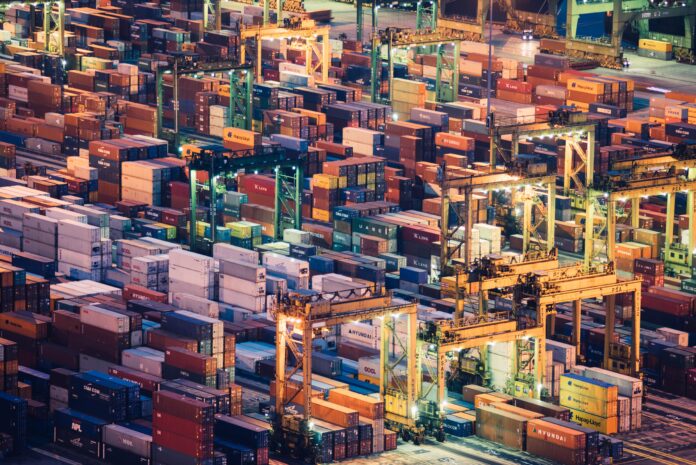The global shipping container industry plays a critical role in facilitating international trade and commerce. It is an integral part of the global economy, with an estimated annual value of over $200 billion. This article provides an overview and analysis of the major players in the shipping container industry, including their market share, strategies, and the key trends that are impacting the industry. The analysis will focus on the major players in the market, including Maersk, MSC, and CMA CGM, and the strategies they are employing to gain market share. Finally, the article will discuss the current trends in the shipping container industry, such as the rise of digitalization, container sharing, and the emergence of new container leasing models.
Table of Contents
Global Shipping Container Industry Analysis
Market size and growth
The global shipping container industry is an integral part of the international supply chain and is estimated to be worth over $100 billion. The market is expected to grow at a CAGR of 4.2% from 2020 to 2027. Factors driving the growth of the market include the increasing globalization of trade, advancements in technology, and the rise in container fleet sizes.
Industry trends
The increasing demand for containerized shipping has prompted several industry trends, such as the adoption of Big Data and AI-enabled technology to improve the efficiency of the shipping process. Additionally, the container industry has been transitioning to more sustainable practices, such as the use of alternative fuel sources and the introduction of more eco-friendly containers.
Major players
The global shipping container industry is highly competitive, with several major players operating in the market. Some of the major players include Maersk, CMA CGM, Mediterranean Shipping Company (MSC), Evergreen Line, and Hapag-Lloyd. These companies have a significant market share and are continually innovating to stay ahead of the competition.
Impact of Global Shipping Container Industry
The global shipping container industry has had a significant effect on many parts of the world. It has provided a cost-effective and efficient way of moving goods around the world, stimulating global trade, and benefiting economies in both developed and developing countries. However, there have been both positive and negative impacts associated with the industry.
Positive effects
The global shipping container industry has had a positive impact on the global economy. It has enabled goods to be moved quickly and cheaply around the world, thus stimulating global trade and boosting economic growth in both developed and developing countries. The industry has also created jobs for many people, both directly and indirectly. Finally, it has enabled companies to produce goods in countries with lower labor costs, thus reducing production costs and increasing profits.
Negative effects
On the other hand, the global shipping container industry has had some negative impacts as well. It has caused environmental damage in some parts of the world, due to air and water pollution from ships. It has also caused social issues such as displacement of local communities and increased competition for jobs. In addition, increased competition has caused wages for workers in the industry to remain low, thus exacerbating existing economic inequality.
Overall, the global shipping container industry has had both positive and negative impacts on the world. While it has helped stimulate global trade, it has also caused environmental damage and exacerbated economic inequality. It is important to ensure that the benefits of the industry are shared equitably and that steps are taken to mitigate the negative impacts.
Conclusion
In conclusion, the global shipping container industry has been growing rapidly over the past few decades, with a tremendous increase in the number of containers being shipped around the world. Although many challenges remain in terms of regulations, increasing container sizes, and the need for new container ports, the industry has a strong potential for continued growth. The industry is also undergoing significant technological advancement, with the use of advanced automation and tracking systems. With the right strategies and investments, the global shipping container industry is well-positioned to become a major player in global commerce in the future.
Frequently Asked Questions
What is the Global Shipping Container Industry?
The Global Shipping Container Industry is a large international market that transports goods over large distances by sea. It is estimated that around 90% of all cargo is shipped by sea in over 20 million containers.
How does the Global Shipping Container Industry benefit society?
The Global Shipping Container Industry is an important part of the global economy and has a significant impact on the lives of people around the world. It helps to reduce costs for businesses and consumers, facilitates international trade, and helps to create jobs.
What is the Analysis of the Global Shipping Container Industry?
The Analysis of the Global Shipping Container Industry involves the examination of various economic, technological, and environmental factors that influence the operations of this industry. This includes examining the current trends, competition, and regulations that affect the industry.
What are the key challenges facing the Global Shipping Container Industry?
The Global Shipping Container Industry faces a number of challenges, including increasing competition, rising costs, environmental regulations, and security concerns. This industry must also be able to adapt to changing technology and customer demands.
What are the effects of the Global Shipping Container Industry on the environment?
The Global Shipping Container Industry has both positive and negative impacts on the environment. Positive impacts include reduced emissions from ships, improved efficiency, and increased recycling. Negative impacts include the release of pollutants into the air, water, and land, as well as noise pollution.


I love how this blog covers a variety of topics, making it appeal to a diverse audience There is something for everyone here!
This blog is like a virtual mentor, guiding me towards personal and professional growth Thank you for being a source of inspiration
I appreciate how well-researched and informative each post is It’s obvious how much effort you put into your work